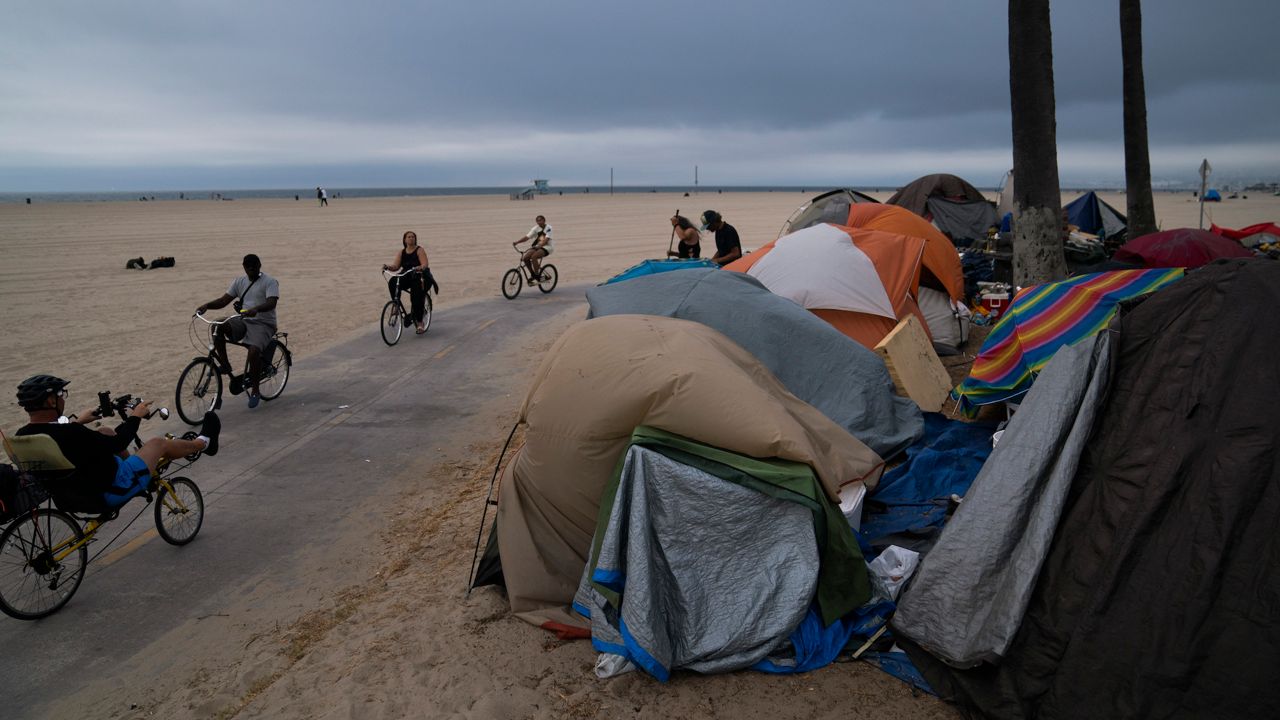LOS ANGELES (CNS) — Mayor Karen Bass joined officials from the White House and the U.S. Interagency Council on Homelessness to introduce an initiative Thursday aimed at addressing unsheltered homelessness across the country as part of a strategic plan to reduce homelessness 25% by 2025.
Through the ALL INside initiative, the USICH and its 19 federal member agencies will partner with state and local governments to "strengthen and accelerate local efforts" to get unsheltered people into homes in six jurisdictions — Los Angeles, the state of California, Chicago, Dallas, Seattle and Phoenix Metro.
Susan Rice, White House director of domestic policy, said the plan emphasizes the importance of pursuing policies that have been proven to work, like Housing First, a federal homeless assistance approach that prioritizes providing permanent housing to people experiencing homelessness. The plan also focuses on homelessness prevention.
"Many of the people who are homeless are veterans, who served our country, and youth, who aged out of foster care and had no supports to help them thrive," Rice said during a news conference introducing ALL INside. "People are living on the streets not by choice, but despite trying to remain housed and for various reasons they could not."
According to Rice, during the coronavirus pandemic, one of the "worst economic" period in the nation's history, the Biden-Harris Administration deployed more than $11 million in emergency rental assistance payments and pursued "ambitious" mortgage forbearance policies to help Americans remain housed.
"That's why homelessness remarkably remained flat between 2020 and 2022," Rice said. "We know we can't meaningfully address our nation's homelessness problem without a distinct focus on unsheltered homelessness."
Veterans Affairs Secretary Denis McDonough, chair of the USICH, touched upon how "much progress" has been made to prevent and end veteran homelessness. Since 2010, there's been a 55% decrease of veterans experiencing homelessness, but there are still more than 33,000 who are, McDonough added.
"For VA's part, not only, we will remain active in this initiative, but we set our own goal to engage 28,000 unsheltered veterans to help them obtain housing and other wraparound services," McDonough said.
Under the initiative, federal officials will be embedded in each community to accelerate locally driven strategies and enact changes to reduce homelessness. Teams will be deployed across the federal government to identify opportunities for regulatory relief and flexibilities, navigate federal funding, and facilitate a peer learning network.
In addition, the Biden administration will undertake policy efforts to address major barriers to housing, health care and other support for people experiencing homelessness.
"Although we will start in the communities that are represented here today, we will share what we learned from this initiative with the rest of the nation, so that together we can ensure that a person that has to sleep in their car or on the street in this country has, like everyone else, a safe, stable, accessible and affordable home," McDonough said.
For the last several months, mayors, local and state leaders worked with the White House to develop the partnership.
Bass called the initiative a "historic" memorandum of understanding with cities. Bass talked about how homelessness has reached emergency levels in Los Angeles, with more than 47,000 Angelenos experiencing homelessness.
She also reviewed how her executive directives continue to streamline and expedite affordable housing developments, and interim and supportive housing. Bass highlighted her Inside Safe program, a citywide strategy to address homeless encampments and bring Angelenos inside.
"We have a bottleneck where we have more than 1,200 people in motel, but difficulty moving them into permanent supportive housing," Bass said.
"That is why this MOU is so important because participating in this MOU might be able to look at things like presumptive eligibility that would allow people to be housed right away, instead of spending months while we complete documents and verify that they're in fact in need."
Bass expressed that in partnership with the Los Angeles Homeless Services Agency and leadership from Va Lecia Adams Kellum, CEO of the agency, the city of Los Angeles can do some "groundbreaking work that can really provide a model for other cities and states experiencing homelessness."



